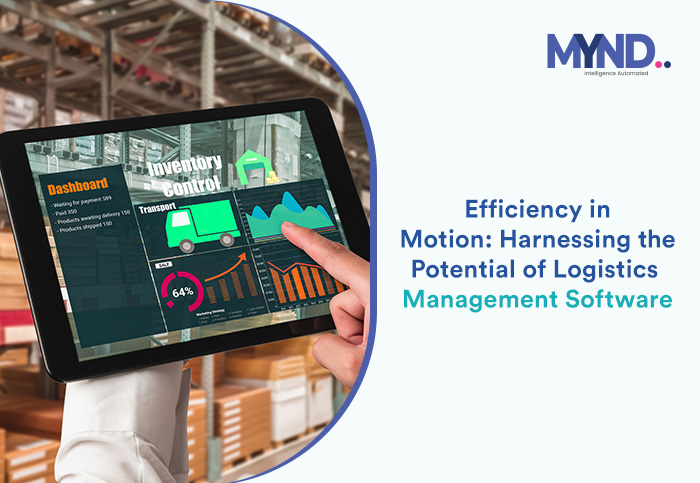Efficiency in Motion: Harnessing the Potential of Logistics Management Software
The logistics and supply chain industry has undergone a radical transformation as technology continues to disrupt and reshape the way goods are moved and managed. With the integration of technology, the industry has become faster, more refined, and more complex than ever before. Efficiency and speed are now critical factors in the logistics and supply chain processes, and companies are turning to new solutions to meet the demands of this ever-evolving landscape.
One such solution that has emerged as a game-changer in the industry is logistics management software. This powerful tool allows organisations to gain visibility across their entire supply chain, from point of origin to point of consumption. With logistics management system software, companies can effectively manage the flow of goods, ensuring that the correct products reach the correct customers within the specified time period.
Investing in logistics tracking software can bring significant improvements to your operations, processes, and delivery. Companies that implement this software have seen improvements in their logistics performance, with greater efficiency, speed, and accuracy. In short, logistics management software is a must-have for companies that want to stay competitive in today's fast-paced and constantly changing market.
What is a
logistics management software?
Logistics management software is a powerful tool that enables businesses to streamline and optimise their supply chain operations. At its core, logistics management involves the planning and execution of the movement of goods from their point of origin to their point of consumption, whether that be to consumers or other businesses. Key components of logistics management include vendor selection, transportation methods, and route optimisation.
Effective logistics management solutions are a crucial aspect of the overall supply chain and is responsible for coordinating a wide range of activities, from product development to commercialisation. A comprehensive logistics management solution may include features such as inbound and outbound transportation management, fleet management, warehouse management, and inventory control. By leveraging these tools, businesses can gain greater visibility into their logistics operations and make more informed decisions to improve efficiency, reduce costs, and better serve their customers.
Challenges impeding logistics management
Logistics management is a complex and dynamic field that is prone to a wide range of challenges. One of the most common challenges is human error, which can result in delays in the delivery of goods and dissatisfaction among customers. Another major challenge is the safe and efficient transport of goods, which requires careful handling and management to ensure that products are not damaged or faulty during transit.
Another critical challenge in logistics management is meeting customer demand. With an increasingly crowded and competitive marketplace, businesses must work hard to ensure that their customers remain loyal and satisfied with their service. This requires a focus on order fulfillment and quality of service, as well as the ability to adapt to changing customer needs and preferences.
Finally, risk management is a key concern in logistics management, as businesses must navigate the complex relationships and partnerships that are required to manage the supply chain. Effective risk management and the ability to make informed decisions are essential for success in logistics operations, which is why logistics management software is an invaluable tool that helps streamline information and guide businesses in the right direction.
Benefits of logistics management software
The implementation of logistics management software offers a wealth of advantages for businesses operating in the logistics field. Some of the key benefits include:
Transportation optimisation: Transportation is a critical component of logistics operations, and it can be costly in terms of fuel, energy, labor, shipping fees, and tolls. Logistics management system software can help manage various transportation means and leverage data to automate the process, allowing for easy analysis and more informed decisions to maximize efficiency.
Faster delivery: Logistics is a linear flow of goods and services, and any issues that arise can cause delays in delivery. Logistics tracking software can improve delivery speed by interacting with the production cycle and selecting the best shipping service.
Reduced human error: Complex data analysis can be challenging and error-prone when done manually. Logistics management software processes data quickly and accurately, reducing the potential for human error and streamlining operations.
Cost reduction: Cost reduction is a major concern for supply chain managers, and logistics software can help them locate costly areas and find ways to reduce costs through effective shipment planning.
LMS by Mynd is an innovative software solution designed to enhance the production process and improve the accuracy of production. The AI-enabled vehicle tracking system offers a range of features, including automatic trip planning and vehicle tracking. These features are particularly useful in industries where route planning for material transportation vehicles is done manually and where proper route planning, vendor selection, tracking, and utilisation of carrier space can have a significant impact on costs.
LMS addresses these issues at their core by automating
the processes of vehicle and route selection and vehicle tracking using
artificial intelligence. The software's advanced algorithms optimise route
trips based on the Material Transfer Request (MTR) and ensure the best possible
route selection with minimum freight. This results in increased efficiency,
improved customer satisfaction, and ultimately cost savings for the company.




Comments
Post a Comment